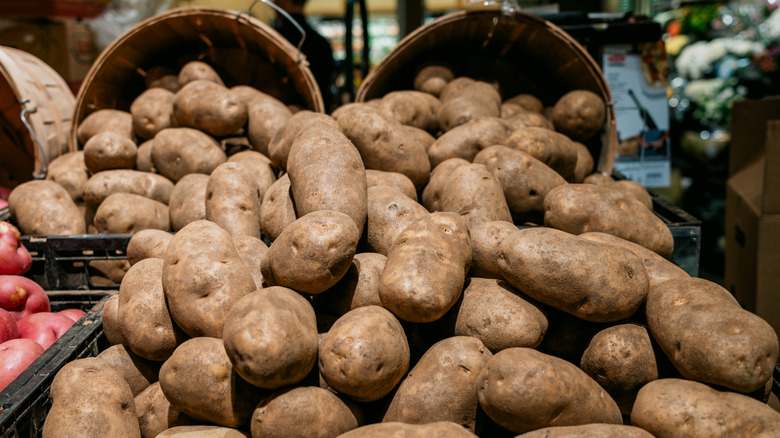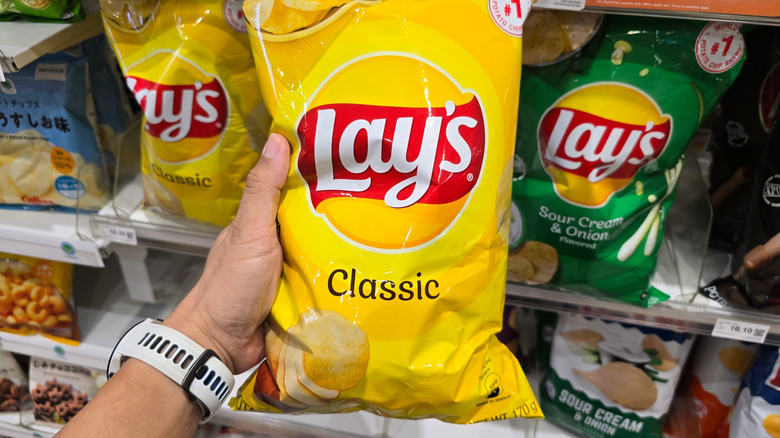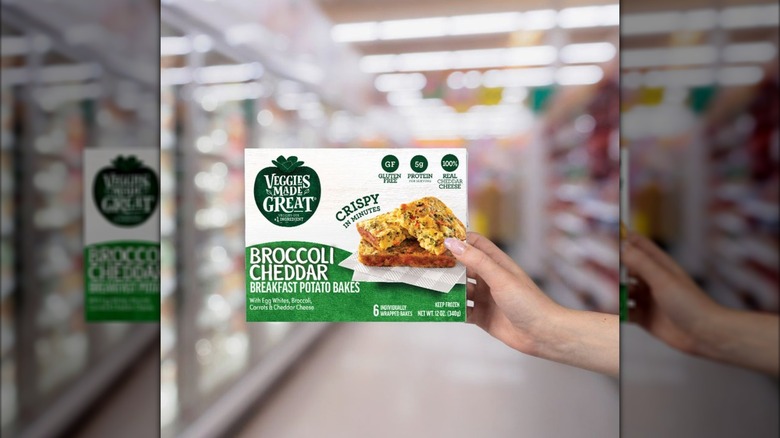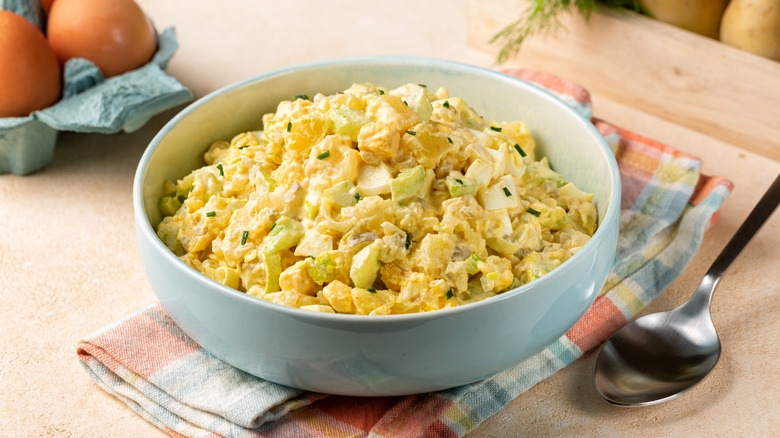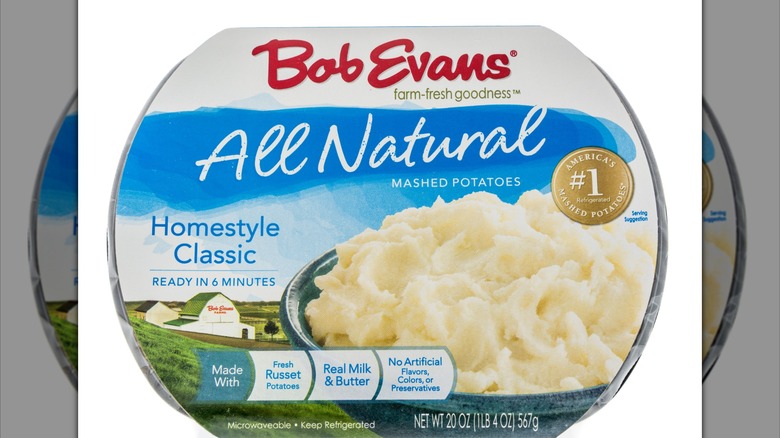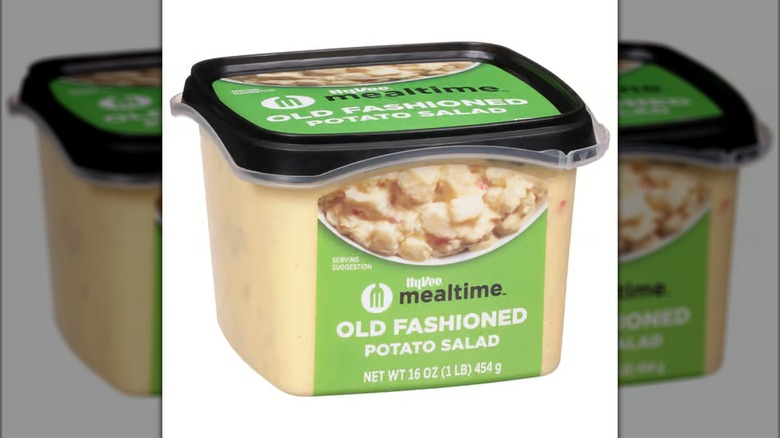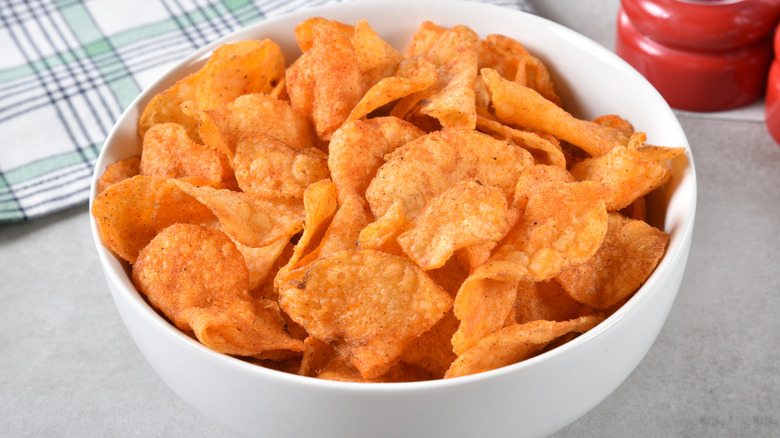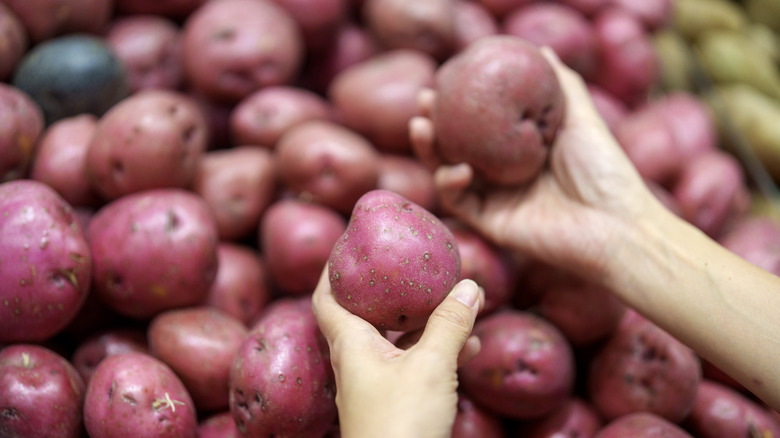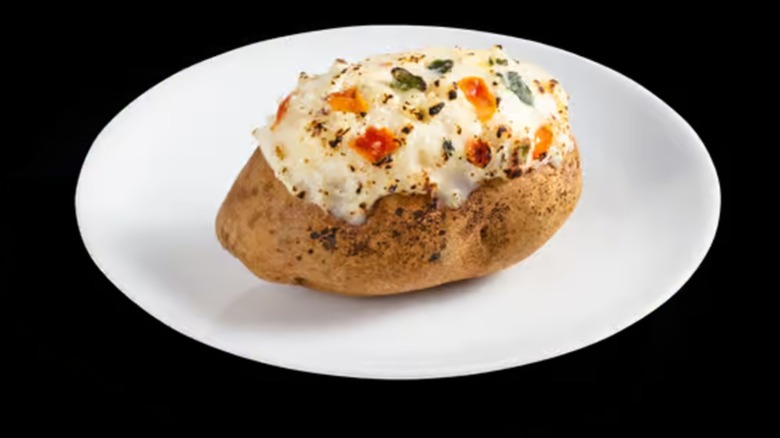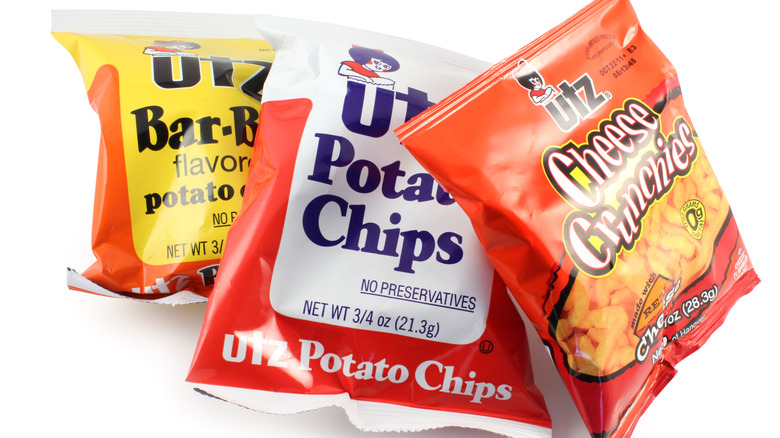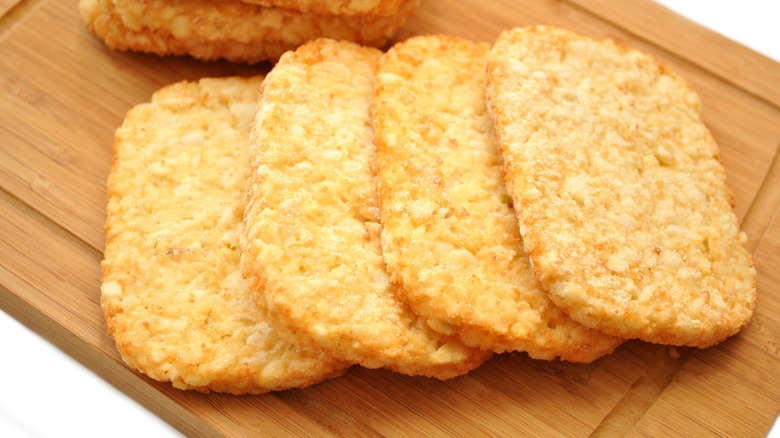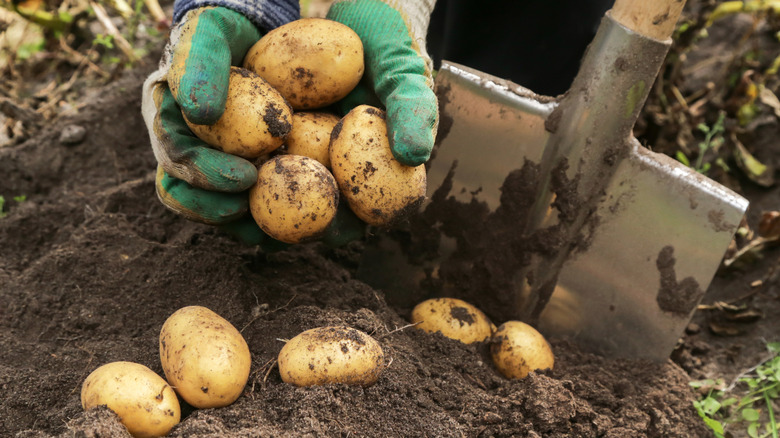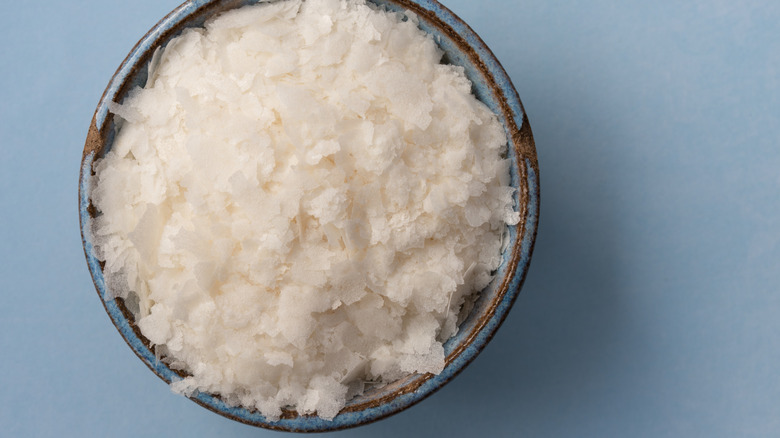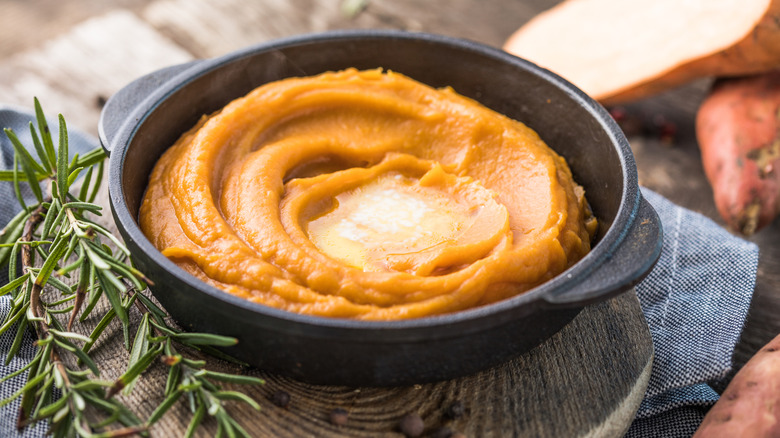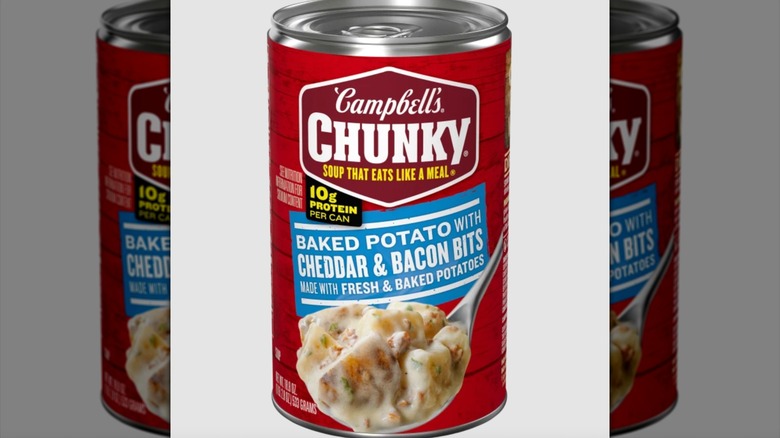Potato Recalls That Affected Millions
Potatoes are the most commonly eaten vegetable in the United States, according to the U.S. Department of Agriculture (USDA). The majority of those potatoes that are consumed are either in a fresh or frozen form, with a smaller amount of potatoes being consumed as potato chips or dehydrated potatoes. Potatoes are also a $100.9 billion industry, with more than 700,000 people working within the potato industry in the United States, per the National Potato Council. So, potatoes are big business, and when you're dealing with something so widespread and so commonly consumed as the mighty potato, chances are likely that you'll run into some mistakes every once in a while — and sometimes those mistakes lead to recalls.
Potatoes are recalled for a variety of reasons: A potato product might contain an undeclared allergen, or foreign objects. Whatever the reason, potato recalls can end up impacting millions of people, as has been the case when you look at these widespread potato recalls from recent decades.
Lamb Weston hash browns recalled due to plastic contamination (2025)
In April 2025, brand Lamb Weston, an Idaho-based potato product supplier that sends its spuds to more than 100 countries, recalled nearly 35,000 cases of its frozen hash brown patties after plastic fragments were discovered in the food. The plastic bits measured from up to a third of an inch in length. Lamb Weston had distributed the affected hash browns to not just a handful of U.S. states, including Arizona and Hawaii, but also to a few other countries, including the United Arab Emirates, Taiwan, Kuwait, and Japan.
The Food and Drug Administration (FDA) assigned this recall a Class II risk, which means the organization feels that the recalled food poses a moderate risk to individuals who might eat it, with temporary or medically reversible adverse health consequences possible, while severe health consequences are unlikely. Still, eating plastic can cause gastrointestinal issues, choking, or dental issues, it's not a risk you want to take.
Lay's Classic potato chips recalled due to undeclared milk (2024)
In December 2024, Lay's Classic potato chips were recalled due to containing undeclared milk, and that recall continued to impact consumers into early 2025, as the FDA watched the situation and decided to upgrade the recall to its highest risk class: Class I. A Class I recall risk means that eating the recalled product could very well cause not just serious health issues but even death.
Of course, the recalled chips pose the biggest threat to those with a milk or dairy allergy. Common symptoms of an allergic reaction to milk include gastrointestinal distress, hives, wheezing, and, in worst case scenarios, anaphylaxis which can be fatal. While Lay's Classic Potato Chips don't typically contain milk, sometimes the chips can come into contact with other potato chips that do contain milk-based ingredients, like the brand's sour cream and onion potato chips. The recall impacted bags of chips distributed throughout Oregon and Washington.
Veggies Made Great brand Broccoli Cheddar Breakfast Potato Bakes recalled for Listeria (2024)
Veggies Made Great brand's Broccoli Cheddar Breakfast Potato Bakes (yes, that is a mouthful) are a take on a hash brown, but include extra protein and veggie goodness by adding in egg whites, broccoli, and carrots. The brand boasts that these frozen breakfast items do not contain popular allergens such as wheat, soy, or nuts, but, in one instance, they did contain something far more threatening: listeria.
In 2024, Veggies Made Great voluntarily recalled more than 10,500 boxes of the potato bakes that had been distributed throughout Arizona, California, Colorado, New Mexico, Utah, and Nevada, as it was discovered that the items had been contaminated with Listeria monocytogenes, the bacteria responsible for causing listeriosis. If you contract listeriosis, you could experience mild symptoms such as gastrointestinal distress for a few days, but you could also contract a more invasive form of the disease that affects the nervous system and can be fatal.
M&P Food Production recalled pirozhki and vareniki for undeclared allergens (2024)
Sure, while pirozhki and vareniki might not claim as much of the American potato market share as french fries, they're not immune from the occasional recall. In 2024, M&P Food Production recalled potato-filled vareniki (if you're not familiar with this Eastern European specialty, think of it as similar to pierogi, just by a different name) and potato-filled pirozhki (a baked or fried bun), alongside blintzes (filled pancakes), all due to undeclared allergens found throughout the producer's product lines.
The recall impacted foods distributed to retail stores throughout Connecticut, Florida, New York, New Jersey, and Maryland, and was due to the FDA's discovery of undeclared wheat, milk, and/or sesame within the products, even though the product packaging didn't state the presence of these ingredients. All of these allergens can cause severe allergic reactions, as well as death, depending on the reaction's severity. Milk allergies are considered one of the most common food allergies in both children and adults, and about 2.4 million people in the U.S. are allergic to wheat, while about 0.7 million people are allergic to sesame.
H-E-B potato salad recalled for plastic contamination (2024)
If there was potato-based food that could be considered risky to your health, it could be potato salad. Potato salad provides the perfect environment for bacteria to grow, and more often than you'd hope, picnic-going and potluck-attending home cooks leave their potato salad sitting out in less than ideal temperatures, allowing bacteria to not just grow but thrive. In one well-documented case, the potato salad at a church potluck hospitalized nearly 30 people, with many needing to remain in the hospital for multiple days and one even dying due to botulism.
In 2024, however, Southern grocery store chain H-E-B recalled its potato salad for a much less deadly but still serious reason: plastic contamination. While no injuries related to the plastic found in the chain's Hill Country Fare potato salad had been reported, and H-E-B removed all the potato salad from the shelf, the chain noted that it was still possible for consumers to find hard plastic in the salad, if they'd managed to buy it at one of the affected Texas locations before the recall.
Bob Evans mashed potatoes recalled due to foreign materials (2024)
Even more plastic in your potatoes! This time, in March 2024, Bob Evans Farms recalled its Bob Evans mashed potatoes as the brand said it was possible that consumers could find small bits of red plastic in the refrigerated dish. The recall impacted nearly 2,500 packages of mashed potatoes that had been distributed across a wide geographic area, throughout Connecticut, Illinois, Massachusetts, New York, Ohio, Pennsylvania, Vermont, and Wisconsin.
It's not uncommon for plastic to find its way into your food. According to a study entitled "Detection and prevention of foreign material in food: A Review" that was published in scholarly journal Heliyon, between 2003 and 2023, foreign material contamination has caused approximately 10% of all food recalls and the most common foreign material to cause these recalls is plastic (with other materials that could end up in your food including wood, metal, stones, and more).
Hy-Vee potato salad recalled due to positive microbial test (2022)
When are most individuals likely to pick up a tub of potato salad at the grocery store? A good guess would be around the July 4 holiday. Unfortunately, on July 1, 2022, Midwestern grocery store chain Hy-Vee announced that it was recalling 10 different versions of its potato salad that had been distributed over Illinois, Iowa, Kansas, Minnesota, Missouri, Nebraska, South Dakota, and Wisconsin.
The reason? The given explanation was vague, but the FDA reported that Hy-Vee had discovered "a presumptive positive microbial result on the line that the potatoes were processed on." The key word is "presumptive" — getting the final tests results, the FDA further explained, would take at least a week, and with the potato salad-centric holiday coming up, Hy-Vee didn't want to take any risks. As such, the chain decided to voluntarily withdraw absolutely all of its potato salad from the store shelves.
Cavendish Farms hash browns recalled due to wheat content (2022)
In March 2022, Cavendish Farms, a Canadian manufacturer, recalled more than 440 cases of frozen hash brown patties that had been distributed throughout Connecticut, Delaware, Maryland, Massachusetts, New Hampshire, New Jersey, New York, Pennsylvania, and Rhode Island at chain stores such as Price Rite and ShopRite.
The hash browns were suspected of containing undeclared wheat, which could cause major issues for not only those with wheat allergies, but those with celiac disease as well. The wheat content had made its way into the hash browns after a third-party supplier had provided Cavendish Farms with a mislabeled ingredient that contained wheat without declaring the wheat's presence. While those with a wheat allergy could experience swelling, hives, itching, gastrointestinal distress, and fatal anaphylaxis after eating something exposed to wheat, those with celiac disease would experience a different yet still serious reaction, with even the smallest amount of wheat causing long-lasting damage to the intestines.
Ballreich Snack Food Company recalled its Bar-B-Q chips due to salmonella (2021)
Salmonella bacteria is a popular reason for various food recalls, as salmonella is the most common form of bacterial food poisoning in the U.S., and in 2021, Ballreich Snack Food Company recalled packages of its Bar-B-Q potato chips as it was suspected that the chips were contaminated with salmonella bacteria after the company's seasoning provider discovered the bacteria during a routine test. The chips had been sold at retailers and convenience stores throughout Ohio, Michigan, and Indiana.
Luckily, no one reported any illness in relation to the recall, but that doesn't necessarily mean that no illnesses occurred. Salmonella symptoms can be mistaken for a variety of illnesses, including just a simple stomach bug. Additionally, you can experience symptoms up to a few days after eating a contaminated food — and it's not like barbecue chips are the first thing you might think of when considering the places you could have contracted the bacteria. Most often, salmonella is associated with raw eggs and meat.
Freshouse II recalled red potatoes due to listeria (2020)
Freshouse II provides retailers with produce under several brand names, including Nature's Promise, Fresh from the Start, and Wegmans — and, in 2020, the company recalled a bevy of produce due to listeria contamination, including oranges, lemons, limes, and red potatoes. The company was undergoing some routine testing and discovered Listeria monocytogenes on a piece of packing equipment. As such, the possibility of the listeria bacteria contaminating the produce that had been packed on that equipment was enough to prompt a recall.
At the time of issuing the produce recall, no illnesses had been reported as connected to the produce that had been distributed around North Carolina, Pennsylvania, South Carolina, Virginia, and Maryland. Freshouse II also noted that the company had stopped using the equipment that had tested positive for the bacteria, and had taken a closer look at its cleaning and sanitation measures.
Hy-Vee recalled baked potatoes due to both listeria and salmonella (2018)
Typically, a recall can be traced back to one root cause: a certain form of bacteria, a singular foreign object, or a particular undeclared allergen. However, in 2018, Hy-Vee was sacked with a one-two punch when it issued a recall due to both the discovery of salmonella and listeria monocytogenes in some of the ingredients used in Hy-Vee's meat and potato products.
The ingredient? McCain Foods' caramelized mushrooms and fire-roasted tomatoes. The impacted Hy-Vee potato products? Its fire-roasted tomato, spinach, and mozzarella twice-baked potatoes. While salmonella and listeria on their own can be deadly, no one wants to take the chance of combining the two and, as such, Hy-Vee recalled the potatoes over its entire eight-state footprint. While no illnesses had been reported related to the recalled potatoes, it's worth noting that it can take up to 70 days for a consumer to fall ill after exposure to listeria monocytogenes.
Utz potato chips recalled because of undeclared soy (2018)
Utz potato chips are a regional favorite. Based in Pennsylvania, the company went public relatively recently, in 2020, and, has since acquired another popular, possibly more widely known snack food brand: On The Border. Today, Utz potato chips can be found nearly all around the country.
Unfortunately, though, that growing brand footprint means that, when a batch of potato chips needs to be recalled, it impacts a large number of states and people. In 2018, this was the case when Utz recalled Utz Carolina Style Barbecue Potato Chips because of undeclared soy in the chips. Utz said the packages were mislabeled and had been distributed to more than two dozen states.Soy allergies come with a wide range of symptoms and, if someone with a soy allergy were to eat the mislabeled chips, they could experience everything from gastrointestinal distress to anaphylaxis to eczema to hives.
McCain Foods hash browns recalled due to plastic and rubber contamination (2017)
Imagine you're having breakfast and you've cooked up some frozen hash browns. You start eating away and then you notice something strange. You pull something that's very much not a hash brown from your mouth and see that it's ... a golf ball? It's not out of the realm of possibility, surprisingly.
In 2017, McCain Foods issued a recall for multiple brands of hash browns sold at a variety of chain stores throughout the country because plastic and rubber from golf balls had been found in the hash browns. The company theorized that the golf ball bits had been mixed in with the potatoes at the time of harvesting, and were never removed. At first, the recall only impacted Roundy's Brand and Harris Teeter hash browns sold in nine states, but, shortly after the first announcement, McCain Foods expanded the recall to include frozen hash browns also sold at Wegmans stores throughout six states.
Linkletter Farms potatoes recalled due to sewing needles (2014)
Finding golf ball parts in your potatoes is one thing. It poses a choking hazard and can definitely be dangerous if you swallow said parts, but it's not as scary as finding sewing needles in your potatoes, which is what happened in Canada in the fall of 2014.
For several weeks, stories spread through the headlines as sewing needles were found allegedly planted in potatoes and french fries that could be traced back to Linkletter Farms and Cavendish Farms. Recalls were issued for the Linkletter Farms potatoes, but not for the Cavendish Farms potatoes, as those products never actually left the processing facility before the needles were discovered. In response, a police investigation began and the Prince Edward Island Potato Board offered a $50,000 reward to anyone who could help uncover who was placing the needles in the potatoes, a process that was theorized was occurring while the potatoes were still in the field. By January 2015, a reward of up to $100,000 was being offered, but no culprit was ever caught.
Strong America recalled dried potatoes due to sulfites (2012)
In 2010, Strong America recalled Golden Smell-branded dried potatoes that had been imported from China. Dried or dehydrated potatoes, or potato flakes, can be reconstituted to make a version of mashed potatoes, but these flakes can also be used as a thickening agent in thin soups, or as a binding ingredient. A routine sampling discovered that the imported dried potatoes contained undeclared sulfites, which can naturally occur in some food, but that are also sometimes added to food as a preservative.
While sulfites aren't one of the most common allergens, they can still cause reactions in sulfite-sensitive individuals, as well as in asthmatics. In fact, up to 5% of individuals with asthma also have a sulfite sensitivity, according to Cleveland Clinic. As for this recall, it's not necessarily an issue that sulfites were found in the potato flakes altogether — in fact, sulfites are fairly common in instant mashed potatoes. Rather, it's the fact that the sulfites weren't listed on the packaging, making them a hazard for some unknowing consumers.
Wegmans recalled mashed sweet potatoes due to plastic contamination (2011)
Once again, plastic finds its way into your potatoes. In 2011, chain store Wegmans recalled 4,000 pounds and more than 2,600 packages of mashed sweet potatoes, after reports arose that the items contained small pieces of white plastic. At the time of recall, the store said that four consumers had complained that they'd found the plastic in their spuds.
This is not at all the only time that Wegmans has needed to recall some of its items due to plastic contamination, though. More recently, in 2024, the store recalled its Food You Feel Good About Fruit on the Bottom Lowfat Pina Colada Yogurt because pieces of blue plastic were mixed into the snack. Additionally in the last two years, Wegmans has also recalled chicken nuggets due to bone fragments being found in the product, braised beef meals due to white rubber pieces being found in the food, and frozen waffles and pancakes due to listeria concerns.
Campbell's soup recalled for hard plastic contamination (2007)
In 2007, Campbell's pulled cans of its Baked Potato with Cheddar & Bacon Bits soup off the shelf because the brand feared that they could contain pieces of a hard plastic. The recall came after three people said they'd been eating the soup and then experienced minor mouth injuries due to that plastic. More than 72,000 cans of soup were impacted and they had been distributed across 24 states.
Campbell's has dealt with a variety of recalls over the years and even in recent history. In 2017, the brand recalled more than 4,000 pounds of soup because people were complaining that they opened up cans of what they thought were chicken noodle soup, only to find Italian wedding soup. Most recently, three different Campbell's soups were recalled in April 2025 because the cilantro they contained had been contaminated with bits of wood and that wood could wind up, unfortunately, in consumer's mouths.
